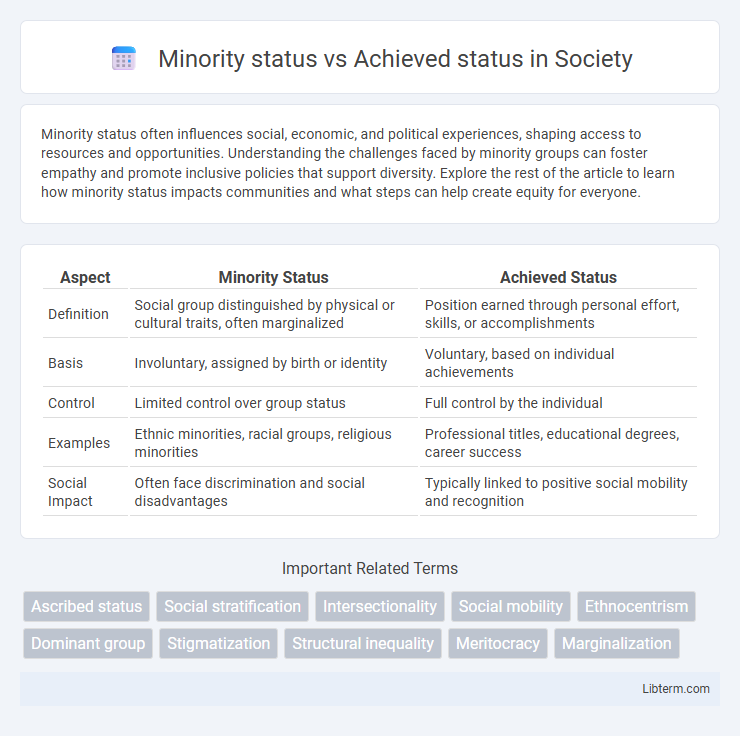Minority status often influences social, economic, and political experiences, shaping access to resources and opportunities. Understanding the challenges faced by minority groups can foster empathy and promote inclusive policies that support diversity. Explore the rest of the article to learn how minority status impacts communities and what steps can help create equity for everyone.
Table of Comparison
| Aspect | Minority Status | Achieved Status |
|---|---|---|
| Definition | Social group distinguished by physical or cultural traits, often marginalized | Position earned through personal effort, skills, or accomplishments |
| Basis | Involuntary, assigned by birth or identity | Voluntary, based on individual achievements |
| Control | Limited control over group status | Full control by the individual |
| Examples | Ethnic minorities, racial groups, religious minorities | Professional titles, educational degrees, career success |
| Social Impact | Often face discrimination and social disadvantages | Typically linked to positive social mobility and recognition |
Defining Minority Status
Minority status is defined by social characteristics such as ethnicity, race, religion, or cultural identity, rather than by numerical population size, emphasizing power dynamics and access to resources within a society. It reflects imposed social distinctions that often result in systemic disadvantages and limited social mobility for the group. This contrasts with achieved status, which is based on individual merit, accomplishments, or personal choices rather than inherited or assigned characteristics.
Understanding Achieved Status
Achieved status refers to a social position a person attains through their actions, efforts, skills, or accomplishments, rather than through birth or inheritance. This status is dynamic and reflects individual agency in areas such as education, occupation, or social mobility. Understanding achieved status highlights how personal achievements contribute to one's identity and influence social interactions within a stratified society.
Key Differences Between Minority and Achieved Status
Minority status is a social identity assigned based on inherent characteristics such as race, ethnicity, or gender, often linked to experiences of discrimination or marginalization. Achieved status, in contrast, is earned through personal effort, accomplishments, or choices, such as educational attainment or professional success. Key differences include the origin of status--minority status is ascribed involuntarily, while achieved status is voluntarily attained--and their impact on social mobility and access to resources.
Origins: Birth vs. Personal Effort
Minority status is typically ascribed at birth, determined by inherent characteristics such as race, ethnicity, or gender, independent of personal choices or achievements. Achieved status results from individual effort, skills, and accomplishments, reflecting social positions earned through personal actions. The distinction highlights how societal roles can be based on immutable traits or dynamic, self-determined progress.
Social Impact of Minority Status
Minority status significantly influences social experiences by shaping access to resources, opportunities, and power within a society, often resulting in systemic discrimination and social marginalization. Unlike achieved status, which is earned through individual effort and accomplishments, minority status is ascribed at birth based on inherent characteristics such as race, ethnicity, or religion, making it a central factor in social identity and group dynamics. The social impact of minority status includes disparities in education, employment, healthcare, and political representation, perpetuating cycles of inequality and social stratification.
The Role of Mobility in Achieved Status
Achieved status is primarily determined by an individual's personal efforts, skills, and achievements, reflecting social mobility through education, career, and income advancements. Minority status, often assigned at birth based on race or ethnicity, is typically ascribed and less influenced by personal actions or mobility. Social mobility plays a crucial role in achieved status by enabling individuals to improve their social position through merit, contrasting with the fixed nature of minority status.
Intersectionality: Overlapping Statuses
Minority status often stems from inherent characteristics like race, ethnicity, or gender, while achieved status is linked to individual accomplishments such as education or career. Intersectionality examines how these overlapping identities create unique experiences of privilege or discrimination, highlighting that a person's social position cannot be understood by considering minority or achieved status in isolation. Understanding the interplay between minority and achieved statuses is crucial for addressing complex social inequalities and promoting inclusive policies.
Societal Perceptions and Stereotypes
Minority status is often ascribed based on inherent characteristics like race or ethnicity, leading to societal perceptions entrenched in stereotypes that influence social marginalization and discrimination. Achieved status, earned through individual accomplishments such as education or career success, can alter personal identity but may not fully counteract stereotypes tied to one's minority group. Social attitudes frequently maintain biases despite achieved status, highlighting the persistent impact of societal perceptions on minority group members.
Addressing Inequalities and Barriers
Minority status, often ascribed at birth based on race, ethnicity, or religion, shapes individuals' experiences of systemic inequalities and social barriers that limit access to resources and opportunities. Achieved status, attained through personal effort such as education or career advancement, can mitigate some disadvantages but seldom eliminates structural discrimination rooted in minority status. Addressing inequalities requires targeted policies that dismantle institutional biases and promote equitable access regardless of ascribed or achieved identities.
Real-World Examples and Case Studies
Minority status is often assigned based on inherent characteristics such as ethnicity, race, or religion, exemplified by the persistent marginalization of Native Americans in the United States despite socioeconomic differences. Achieved status reflects an individual's accomplishments or actions, as seen in the rise of Barack Obama, who transcended racial barriers through education and political success. Case studies of immigrant communities illustrate how minority groups attain achieved status through education and economic advancement, yet still face systemic challenges tied to their minority identity.
Minority status Infographic

 libterm.com
libterm.com